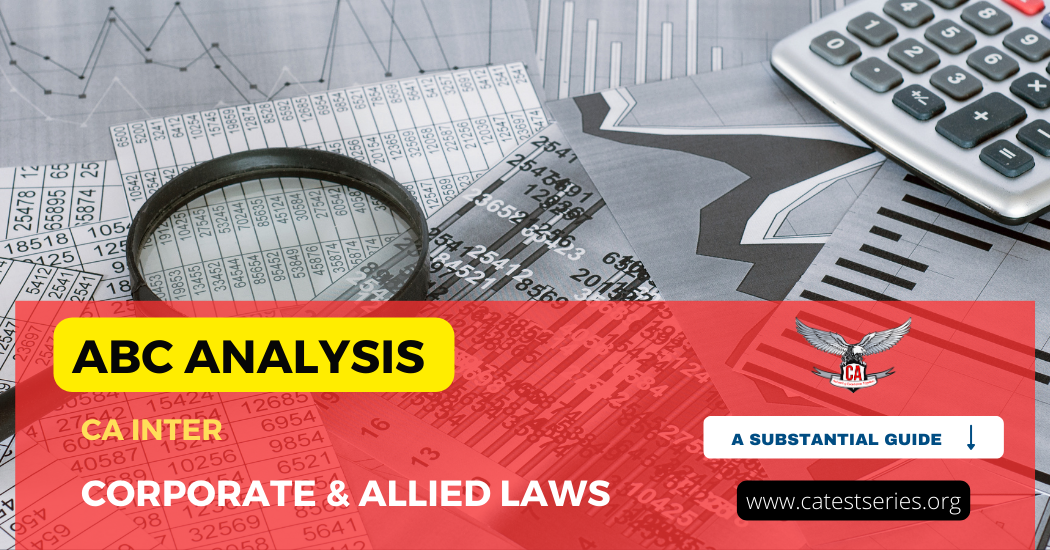ABC Analysis for CA Inter Corporate and other Laws for ICAI 2026 Exams | Topic Wise Weightage
ABC Analysis for CA Intermediate Corporate and Allied Laws: A Substantial Study Guide
Corporate and Allied Laws is a rather voluminous and theory-based subject for a CA Intermediate student. So, in that vast expanse of study material, what to prioritize and not is very important so that maximum benefits are gained in the exams. ABC analysis is a strategic study technique used to classify the topics under three levels, with significance levels A, B, and C.
What is ABC Analysis?
ABC analysis is generally conducted in every field for the classification of the product with the importance one has attached to it. Moving along with the syllabus of the CA Intermediate, the syllabus is divided into three different heads, which include:
- A Topics – High-priority topics that are critical for scoring and often have high weightage in exams.
- B Topics – Moderately important topics that support the main content and may have some exam relevance.
- C Topics – Less emphasized areas that are less likely to appear in exams but should still be reviewed.
Applying ABC Analysis to Corporate and Allied Laws
Corporate and Allied Laws is a subject that covers diverse topics, including company law, general contract principles, and specific laws related to various corporate entities. Each topic has different importance levels in the CA Intermediate syllabus. Here is a breakdown of how to approach this paper using ABC analysis.
“A” Topics (High Importance)
High-priority topics in Corporate and Allied Laws often carry significant weight in exams. According to VSI Jaipur, these are the chapters where you should invest maximum focus:
- The Companies Act, 2013 – The Companies Act is the core of Corporate Law for CA Intermediate. It includes topics such as:
- Incorporation of Companies – Key aspects of formation, registration, and incorporation.
- Directors and Board Meetings – Roles, responsibilities, and compliance requirements for directors.
- Accounts and Audit – Legalities concerning company records, audits, and financial statements.
Since these areas are frequently tested and carry high marks, focus on understanding the clauses, important sections, and their practical applications. The Companies Act is essential for gaining a strong grasp of corporate governance, a topic that examiners prioritize.
2. The Indian Contract Act, 1872 – The ICA is a foundational law, and its principles apply to all business dealings, making it highly significant. the areas that it focuses on are-
- Contracts of Indemnity and Guarantee
- Agency and Bailment
Learning such topics provides great benefits to the students as they are essential to both corporate and allied legal studies. Understanding the structure of contracts and obligations will also aid in other business law applications.
“B” Topics (Moderate Importance)
B Topics are moderately significant and complement the core material. These topics may appear in exams as secondary questions, so they should be studied after mastering A Topics.
- The Negotiable Instruments Act, 1881 – Checks, bills of exchange, and promissory notes are all included in this statute. Dishonour and the discharge of negotiable instruments are the main topics of these sections. Liability and legal presumptions in various situations.
- General Clauses Act, 1897 – This law aids in understanding the terminology used across various statutes, which is useful for interpretation questions.
- The Prevention of Money Laundering Act, 2002 – This deals with money laundering regulations that impact the corporate law because of their influence over corporate transparency and compliance. Though not as critical as the Companies Act, these are important to understand the legal structure of dealing in corporations and are often tested as indirect or case-based questions.
“C” Topics (Low Importance)
C Topics in Corporate and Allied Laws are less emphasized but still part of the syllabus. Although they are less likely to appear as main questions, reviewing them can help with objective questions or case scenarios.
- The Limited Liability Partnership Act, 2008 – While LLPs are not as commonly featured as companies, they are useful for understanding alternative business structures.
- The Insolvency and Bankruptcy Code, 2016 – Although significant, this code generally receives less emphasis in intermediate exams but can appear in a few indirect questions.
- The Foreign Exchange Management Act, 1999 (FEMA) – FEMA principles may be tested but often with minimal weight. It is still useful for students who wish to understand cross-border business regulations.
How to Effectively Use ABC Analysis for Exam Preparation
- Prioritize Topics First – Start your studies by mastering the A Topics. Use ICAI study materials, which are designed with a focus on high-weightage areas. Study these thoroughly, as they are the foundation of Corporate Law.
- Develop a Study Timeline – According to VSI Jaipur, organizing your study schedule around ABC priorities is essential. Allocate more time to A Topics, then focus on B Topics, and review C Topics last.
- Utilize Practice Papers and Mock Tests – Practice is key to CA exams. Mock tests, available on sites like VSI and CA Exams Blog, help in assessing your knowledge across ABC categories. Practice questions frequently to get comfortable with the format and the level of detail required.
- Summarize Key Sections and Cases – Preparing quick notes on the most important sections, definitions, and case laws within each topic helps retain information and make quick revisions before the exam.
- Stay Updated with Amendments – Corporate laws are dynamic, and recent changes can be significant. Check reliable sources, like VSI updates, to ensure that your notes are current, especially in A Topics like the Companies Act.
Resources for ABC Analysis in CA Inter Corporate and Allied Laws
For additional guidance on ABC Analysis and key Corporate and Allied law topics, check these resources:
- VSI Jaipur – Offers comprehensive CA Inter resources and specific ABC analysis guides. VSI Jaipur - CA Intermediate ABC Analysis.
- CA Exams Blog – Provides insights into CA study techniques and ABC analysis for time management and prioritization. CA Exams Blog.
- Aubsp – Details the CA Intermediate syllabus and offers topic prioritization advice. Aubsp - CA Intermediate Syllabus.
- LearnCab – Discusses effective study methods and the CA Inter Corporate and Allied Laws curriculum. LearnCab - CA Intermediate Corporate Law
Conclusion
For CA Intermediate, ABC Analysis provides a targeted and methodical approach to learning Corporate and Allied Laws. Students can study more effectively and cover important material without being overwhelmed by classifying topics into high, medium, and low priority. Prioritize “A” Topics like the Companies Act and Indian Contract Act, supplement with B Topics, and review C Topics as time permits. With the right resources and study strategy, you will be well-prepared for the exam and ready to excel in Corporate and Allied Laws.












